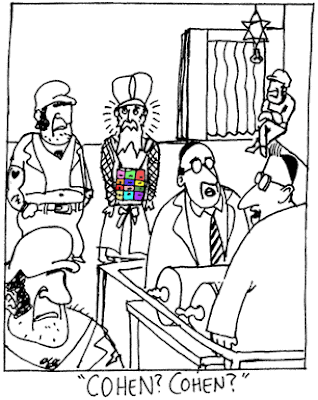 |
| Art: Jacek Yerka |
Written by Rabbi Zamir Cohen
The existence of an Afterworld and the fact that there is life after death are fundamental principles of the Jewish religion. Already in Genesis 2:7, the Torah testifies to the existence of the soul and its eternity. It says: “The Lord God formed the man dust from the earth, and He blew into his nostrils the breath of life, so that man became a living soul.”
Commenting on this verse, the Zohar says: “One who breathes, breathes from himself,” indicating that the soul is a part of God. Since God’s essence is entirely spiritual, and not material, it is inconceivable that the soul is transitory.
To those who believe in a God Who oversees His handiworks and Whose deeds are based on justice, the fact that there is life after death is a logical and rational corollary of reality. If there were no Afterworld, then this world would be just a playground without any importance, or without any future ramifications. If such were the case, Hitler could have murdered six million Jews without having to account for his crimes after his death, Heaven forbid. Obviously, God Who watches over man must also have reserved a place where good people receive rewards, and the wicked are punished, even though it is not visible to mortal eyes.
A frequently asked question is: why do righteous people suffer, while the wicked enjoy life? In general, people think that a good life is a comfortable, financially well based and illness-free one, while every other type of life is bad. This view is correct when one confines his outlook on life only to the here and now. However, when one is aware of the existence of a soul and understands that there is an eternal Afterworld, the picture becomes totally different. With such a realization, one understands that those righteous people who suffer on earth, receive everlasting reward in the World to Come, while the wicked do not receive this everlasting reward, and are even punished in the Afterworld.
This realization also makes our suffering on earth bearable, because what are 70-80 years of suffering, in comparison to the eternal life of joy awaiting the righteous in the Afterworld? When measured in the light of eternity, they are a mere drop in the bucket — a fleeting period which passes before we know it.
From the Jewish point of view, the existence of the eternal soul is no less evident than the palm of one’s hand. “This world” is the world of action and doing, the world of “here and now.” In the Afterworld, we experience the eternal manifestation of our essence, as we fashioned it here on earth. It is inconceivable that, after causing the suffering and death of millions of people, Hitler could free himself of his responsibility simply by swallowing a capsule of poison. Obviously absolute justice will take its toll in a different dimension of reality.
Bearing in mind that ultimate delight is achieved by forming an eternal bond with God, who is the truly happy person- one who leads a comfortable life, but has a weak link to God, or one who suffers many hardships, yet develops a close link to God? Which of these two types will be happier, in terms of eternal existence?
What is Life After Death? When a person’s soul reaches Heaven, it doesn't undergo an arbitrary trial, which is forced on it by an external and alien element. At that time, it is shown various scenes, which pass before his eyes like a movie or film. The first film may be called, "This is Your Life", and depicts all of the decisions one made, the thoughts he entertained and the good and bad deeds he committed throughout his life. But the soul isn’t the only entity, which sees these scenes. They are divulged to all the other souls in Heaven, who bear any relationship with him.
The Afterworld is called the “World of Truth” because there we are apprised of the true value of all our good deeds and the true ramifications of all our flaws, as well as of life’s genuine purpose.
The second film describes how one could have lived, if he had made the right decisions in his life and had seized the opportunities presented to him to realize his potential. This film, which illustrates the sorrow created by wasted potential, is harder for him to bear than the first one. However, it purifies and cleanses him no less thoroughly than the first one. The sorrow and the suffering result in remorse, which terminates in the removal of the barriers which his bad deeds and faulty decisions created between him and God and enable his soul to totally connect to its Creator.This experience is what we refer to as Gehinnom (Purgatory).
Gehinnom isn’t a place occupied by a demon with a spear and burning charcoals. It is a place where our bad deeds are exposed to all, with all the accompanying pain and shame they engender. But not all souls merit reaching Gehinnom. It is meant for people who have performed good deeds in their lives, but must still undergo purification due to their bad deeds. However, there are a few people on earth who are so wicked, that they don’t even merit to reach Gehinnom, but receive eternal punishment. (Pharaoh is an example of such a person.)
Gan Eden (Paradise) is where the soul arrives after its sins have been expiated. It is where the soul experiences the greatest possible delight — the feeling of closeness to God. Not all souls experience the same degree of delight in Gan Eden. Instead, it is like a large concert hall, which has seats in the front, the middle and the back rows, as well as in the mezzanine. The status of a soul in the World of Truth is determined by the levels and quality of a person’s good deeds on earth.
Every good deed one commits may be discharged in many ways. One can give charity in secret, or can boast about his deeds. He can do a kindness genially or begrudgingly.
A second factor which determines the essence of the quality of the Gan Eden one merits is his relation to spiritual pursuits in this world. A person can have a front seat at a concert, but if he hasn’t attuned his ear to the music being played, he won’t truly appreciate it. Thus, if a person engages in activities which purify his soul and develops a sensitivity to a spiritual reality, he will have untold delight when he reaches Gan Eden. However, if his life centers on earthly delights – eating, indulging, and entertainment — then he won’t enjoy the spiritual delights offered him in the World to Come.

































